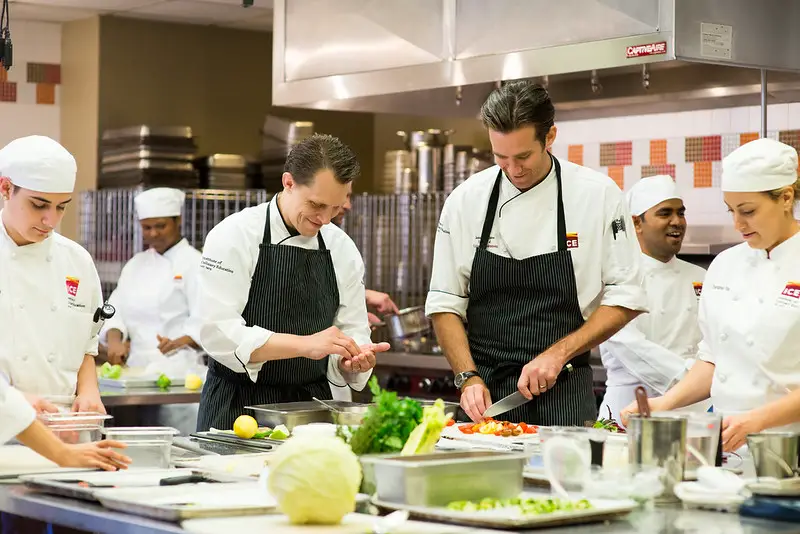
In the culinary world, the sous chef is the bridge between the kitchen staff and the executive chef. As second-in-command, the sous chef’s role is crucial in maintaining the quality, flow, and overall success of a kitchen.
One of the best ways for a sous chef to grow in their career is by learning from the executive chef.
This article will explore five ways a sous chef can gain valuable insights and lessons from working closely with an executive chef, helping them advance in their career and prepare for the day they run their kitchen.
1. Master the Art of Leadership
One of the most important skills an executive chef possesses is leadership. The executive chef oversees the entire kitchen operation, from menu development to staff management.
For a sous chef, observing how the executive chef leads the team, handles conflict, and motivates staff is essential to their professional development.
What Sous Chefs Can Learn:
- Delegation and Trust: Executive chefs are experts at delegating tasks, ensuring that everyone in the kitchen is working efficiently. Sous chefs can learn to trust their team by watching how executive chefs distribute responsibilities and rely on their staff to execute flawlessly.
- Conflict Resolution: Kitchens can be stressful environments. Executive chefs are often responsible for maintaining peace and resolving conflicts quickly. By observing how an executive chef handles disputes or high-pressure situations, sous chefs can learn to manage similar issues calmly and effectively.
2. Understand Menu Development and Food Costing
A critical part of the executive chef’s role is developing menus that reflect the restaurant’s brand while also managing food costs.
This balance of creativity and financial oversight is a skill that sous chefs should pay attention to, as it will be key to their future success.
What Sous Chefs Can Learn:
- Menu Planning: Executive chefs often have years of experience crafting menus that are seasonal, innovative, and in line with the restaurant’s vision. Sous chefs should participate in the menu creation process, learning how to balance creative dishes with customer preferences and operational feasibility.
- Cost Control: Executive chefs are responsible for food costing, ensuring that dishes are profitable without sacrificing quality. Sous chefs can gain a deeper understanding of how to manage inventory, minimize waste, and calculate portion sizes to keep costs down while maintaining high culinary standards.
3. Improve Time Management and Organizational Skills
Time management is essential for any chef, but executive chefs take this to the next level by coordinating kitchen staff, managing suppliers, and overseeing multiple tasks simultaneously.
A sous chef can learn how to become more organized and efficient by observing how an executive chef manages time in and out of the kitchen.

What Sous Chefs Can Learn:
- Efficient Kitchen Operations: Executive chefs are excellent at organizing kitchen staff and workflows. Sous chefs can learn how to streamline kitchen operations, from preparing mise en place to managing service during rush hours.
- Multitasking: From overseeing deliveries to checking on the dining room, executive chefs are master multitaskers. Sous chefs can enhance their ability to juggle various tasks by paying attention to how an executive chef prioritizes and switches between responsibilities.
4. Refine Communication Skills
Effective communication is one of the cornerstones of a successful kitchen. Executive chefs must communicate clearly with their team, front-of-house staff, suppliers, and even customers.
As a sous chef, learning how to improve communication is crucial for ensuring smooth kitchen operations and maintaining a positive work environment.
What Sous Chefs Can Learn:
- Clear Instructions: Executive chefs give precise directions to ensure that dishes are prepared consistently and correctly. Sous chefs can learn how to give clear instructions, minimize misunderstandings, and ensure high-quality output.
- Bridging the Gap: Sous chefs often act as intermediaries between the kitchen staff and the executive chef. By learning how executive chefs communicate with other team members, sous chefs can improve their ability to relay information and provide feedback effectively.
5. Embrace Creativity and Innovation
Executive chefs are known for their creativity and ability to innovate. They set the tone for the restaurant’s culinary direction, experimenting with new ingredients, techniques, and presentation styles.
Sous chefs should view this as an opportunity to learn how to push boundaries and explore their culinary creativity.
What Sous Chefs Can Learn:
- Experimentation: Executive chefs often encourage experimentation to stay ahead of culinary trends. Sous chefs can learn the importance of continuous learning, embracing new ideas, and testing new recipes or cooking techniques.
- Balancing Tradition and Innovation: While creativity is essential, executive chefs also know how to balance innovation with traditional cooking methods. Sous chefs can develop their unique style by observing how executive chefs incorporate both classic techniques and modern twists.
Conclusion
For sous chefs, learning from an executive chef is one of the best ways to advance their culinary career.
By observing how an executive chef leads the kitchen, manages time, communicates, handles finances, and embraces creativity, sous chefs can develop the skills necessary to step into an executive role themselves.
Fostering a proactive learning attitude and seeking mentorship from an executive chef can set a sous chef on the path to long-term success in the culinary world.
This article analyzes briefly, and summarizes on culinary education that are provided at a chef school.
this is an informational writing for those in the culinary profession who are seeking vacant job positions for chefs.
Grapes, oranges, and pomegranates. photo: pixfuel The scope of hospitality operations is expanding by the day. The job is becoming Read more
the assistant culinary manager is a stand-in, or representation the head chef in it's absence. read this blog post to Read more
Author
-

Benedict Ohia is a seasoned chef with over 15 years of experience in the culinary industry. Passionate about food, innovation, and mentoring others, Benedict combines his chef expertise with his storytelling talent as the founder of CatererCareers.com. Through his niche website, he provides invaluable insights, tips, and resources for aspiring chefs, caterers, and hospitality professionals. Whether guiding career growth or sharing industry trends, Benedict is dedicated to inspiring others to succeed in the dynamic world of catering and culinary arts.
View all posts




